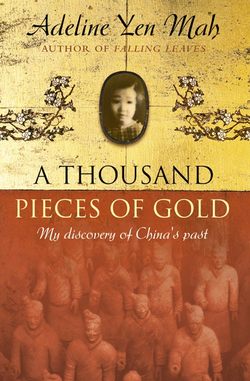Читать книгу A Thousand Pieces of Gold: A Memoir of China’s Past Through its Proverbs - Adeline Mah Yen - Страница 5
Note on Pronunciation
ОглавлениеChinese is a pictorial, not a phonetic, language. Words are pronounced differently in different provinces, even though they are written in the same way and have the same meaning. This was true even during the time of the Warring States (475–221 BC). The historian Sima Qian began the biography of the assassin Jing Ke with these words: ‘Jing Ke was born in the state of Wei [present-day Henan province]. The natives of Wei pronounced his name Master Qing, but those from the state of Yan called him Master Jing.’
After the Communists conquered China in 1949, they standardised the phonetic spelling of Chinese characters throughout China according to the Beijing dialect, or Mandarin, and called it Pinyin. Pinyin is defined as the phonetic, alphabetic spelling of Chinese writing.
I would like to introduce a few famous figures from Chinese history to western readers using Pinyin. This is not an exhaustive list of all the names that appear in this book, of course, but it gives an overall flavour of how Chinese names are pronounced.
| Preface | Deng Xiaoping should be pronounced Dung Shiaoping because the letter X is pronounced SH in Pinyin. |
| Zhuangzi should be pronounced Jwaang Tze because the letters Zh are pronounced J in Pinyin. | |
| Li Si should be pronounced Lee Si because Li is pronounced Lee. | |
| King Zheng should be pronounced King Jung. | |
| Qin should be pronounced Chin because the letter Q is pronounced Ch. | |
| Zhao should be pronounced Jow. | |
| Qi should be pronounced Chee. | |
| Chapter 1 | Sima Qian should be pronounced Sima Chien. |
| Ren should be pronounced Run because en is pronounced un in Pinyin. | |
| Zhou dynasty should be pronounced Jo dynasty. | |
| Qin Shi Huangdi should be pronounced Chin Shi Hwangdee. | |
| Chapter 2 | Zhong Kui should be pronounced Jong Kwei. |
| Chapter 3 | Xi should be pronounced She. |
| Chapter 5 | Han Feizi should be pronounced Haan Fay Tze. |
| Jiang Qing should be pronounced Jiang Ching. | |
| Chapter 7 | Xu Fu should be pronounced Shü Foo. |
| Zhang Liang should be pronounced Jaan Liang. | |
| Meng Tian should be pronounced Mung Tien. | |
| Chapter 8 | Meng Yi should be pronounced Mung Yee. |
| Zhao Gao should be pronounced Jow Gow. | |
| Hu Hai should be pronounced Who Hi. | |
| Fu Su should be pronounced Foo Soo. | |
| Chapter 9 | Xiang Yu should be pronounced Shiang Yu. |
| Liu Bang should be pronounced Liu Baang. | |
| Chapter 10 | Zhang Han should be pronounced Jaang Haan. |
| Chapter 11 | Fan Kuai should be pronounced Faan Kwai. |
| Sima Xin should be pronounced Sima Sheen. | |
| Chapter 12 | Xiao He should be pronounced Shiao Huh. |
| Chapter 14 | Hahn Xin should be pronounced Hahn Shin. |
| Chapter 16 | Kuai Tung should be pronounced Kwai Tung. |
Unlike the western world, Chinese surnames are pronounced first, to be followed by the given names. For instance, my maiden surname is Yen and my given name is Junling . Thus my Chinese name is Yen Junling .
My husband Bob’s surname is Mah . When I married Bob, my Chinese name became Mah Yen Junling , whereas my English name became Adeline Yen Mah.
In a similar vein, Deng Xiaoping’s surname was Deng . His given name was Xiaoping .
Mao Zedong’s surname was Mao , and his given name was Zedong .
Sima Qian’s surname was Sima , and his given name was Qian .
